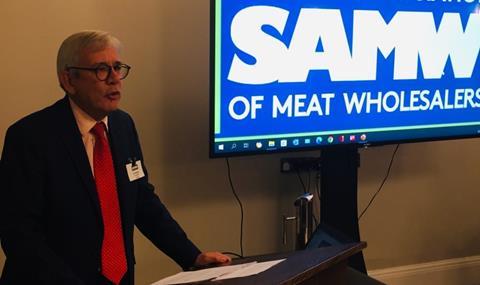Speaking at the Scottish Association of Meat Wholesalers’ (SAMW) annual conference, president Ian Bentley outlined a vision of what things could look like in a decade for the sector.

The theme of this year’s conference was “A sustainable future for red meat supply”, with speakers at the event including Cabinet Secretary Mairi Gougeon MSP, CEO of Quality Meat Scotland (QMS) Sarah Miller and Lesley-Ann Gray from Kantar.
Addressing the conference Bentley spoke about current anti-meat sentiment, his hopes for expanding global exports and the need to make the industry more technologically efficient.
Addressing anti-meat sentiment
According to Bentley’s vision, by 2030 the moderate consumption of red meat will be recognised world-wide as an essential part of a healthy diet. He explained: “I have no quibble with people who follow a particular diet through personal choice. I do have a problem with pressure groups and vested interests who seek to attack our industry with distortions or, as people say now, 'alternative facts'. I hope that within a few years those falsehoods will be exposed.”
Accurately measured emissions
Bentley hopes that, by 2030, the levels of net carbon emissions produced by different methods of rearing livestock will be accurately measured.
He said: “By then, hopefully we will have a clear picture about good and bad practices, and we will be on the way to promoting the good systems and eradicating the bad, helped by a government which rewards the good, and supports a Scottish red meat industry for the long term.”
Increased global trade
Bentley added that he would like to see red meat exports from Scotland going across the world, “in recognition of the quality and sustainability of our product, and hopefully by then no longer hobbled by export regulations which seem to do everything possible to discourage trade rather than promote it.”
He said that government will need to play a part in removing these obstacles, and that trade bodies and SAMW members will need to capitalise on the opportunities which will emerge.
It is also a priority for Bentley that “the true cost” of meat production be recognised over the next decade. He explained: “Today and in the future, our industry needs to embrace the technological and information revolution which is transforming other industries. The use of data analysis for soil, feed and rearing at the producer level; artificial intelligence and robotics for processors, pinpointed distribution at retail levels to reduce wastage.
“All these can drive out costs and improve margins without simply passing on higher prices to consumers.”
Bentley thanked his immediate predecessor Alan McNaughton, along with executive manager Martin Morgan, for their work over the past year. He also welcomed Alan Brown in his role as vice-president, stating he is looking forward to working alongside him over their period of tenure together.
This story was originally published on a previous version of the Meat Management website and so there may be some missing images and formatting issues.












